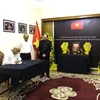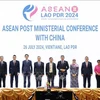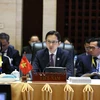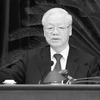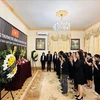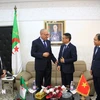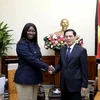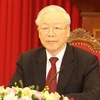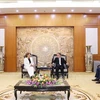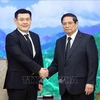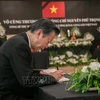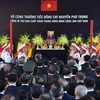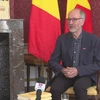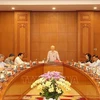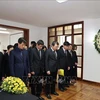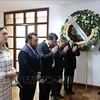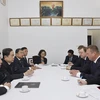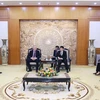The ASEAN+3 Summit between the Association of Southeast Asian Nations, Japan, the Republic of Korea (RoK) and China, and a series of ASEAN+1 Summits between the regional grouping with China, Japan, the RoK, India and the US, took place in Phnom Penh on November 19.
The summits focused on measures to strengthen relations between ASEAN and its partners, especially in assisting the group in building the ASEAN community by 2015.
Speaking at the summits, Vietnamese Prime Minister Nguyen Tan Dung emphasised the region’s common priorities to increase efforts to build the ASEAN Community and ensuring peace, stability, security, cooperation and development in the region.
He presented practical measures to ensure the effective and timely implementation of cooperation programmes and projects within ASEAN as well as between the association and its partners in economics, trade, investment, human resource development, information technology, science and technology, adaptation to emerging challenges and non-traditional security issues.
Dung suggested partners continue to support and assist the association in building the ASEAN community, especially intensifying regional links and connectivity as well as narrowing the development gap, including Greater Mekong Subregion (GMS) cooperation, ensuring sustainable use of Mekong River water sources and expanding comprehensive cooperation between Mekong countries and their related partners.
The PM stressed supporting the central role of ASEAN at regional frameworks and forums such as ASEAN+1, ASEAN+3, East Asia Summit (EAS), ASEAN Regional Forum (ARF) and the ASEAN Defence Ministerial Meeting Plus (ADMM+).
He suggested ASEAN continues promoting its key role in the regional structure, boost cooperation with partners for the common goal of peace, stability, security and cooperative development in the region.
Speaking of the East Sea issue, Dung emphasised support for concerned parties in fully and effectively implementing the Declaration on the Conduct of Parties in the East Sea (DOC), ASEAN’s Declaration on Six-Point Principles and the early conclusion of a Code of Conduct in the East Sea (COC) in order to ensure peace, stability, maritime security and safety in the East Sea on the basis of abiding by international law and the 1982 United Nations Convention on the Law of the Sea (UNCLOS), including regulations on respecting coastal states’ exclusive economic zones and continental shelves.
The Vietnamese PM spoke highly of ASEAN and its partners’ cooperation outcomes, including those between ASEAN and China during Vietnam ’s term as ASEAN Coordinator from July 2009 to July 2012 in such fields as economics, trade, adaptation to natural disasters and climate change, education, cultural exchange and the implementation of DOC towards the building of COC.
He applauded the ASEAN-China adoption of a declaration on celebrating the 10 th anniversary of DOC in order to affirm the value, importance and full implementation of DOC. This in turn will contribute to peace, stability, maritime security and safety in the East Sea , and the peaceful settlement of disputes on the basis of abiding by international law, particularly the UNCLOS 1982, towards the building of COC.
At the summits, ASEAN and partner leaders highly value recent progress and discussed measures to further strengthen cooperation between all sides to meet their common interests.
ASEAN and its partners agreed to focus their resources to implement programmes of action that will boost cooperation in all fields, ranging from economics, trade and investment to non-traditional security issues and adaptation to challenges such as climate change, disaster management, trans-national crimes and maritime security and safety, including piracy.
ASEAN and its partners appreciated the decision to official start negotiations for the Regional Comprehensive Economic Partnership (RCEP) Agreement.
ASEAN countries reaffirmed their open foreign policy and continued to encourage partners to make contributions to regional cooperation as well as assisting the association in building the ASEAN Community. The partners pledged to continue support for ASEAN in building the community by 2015, stepping up regional links and connectivity and narrowing the development gap, as well as support for its central role in regional cooperation processes and frameworks.
Exchanging views on regional issues of mutual concern, ASEAN leaders and partners agreed to further intensify joint efforts for peace, stability, security and development cooperation in the region. The nations voiced their support for a peaceful, stable and nuclear weapon-free Korean Peninsula as well as parties’ efforts in improving the Inter-Korean relations and the early resumption of the six-party talks.
Regarding the East Sea , leaders stressed their concerns, mutual benefits and the importance of ensuring peace, stability, maritime safety and security in the East Sea , and for relevant parties to comply with international laws and the UNCLOS 1982, fully and effectively implement DOC, ASEAN’s Six-Point Principles on the East Sea and the early conclusion of the COC.
The 7th East Asia Summit (EAS), ASEAN Global Dialogue and a meeting among leaders of countries participating in the negotiations for the Trans-Pacific Partnership (TPP) Agreement are scheduled to take place on November 20./.VNA
The summits focused on measures to strengthen relations between ASEAN and its partners, especially in assisting the group in building the ASEAN community by 2015.
Speaking at the summits, Vietnamese Prime Minister Nguyen Tan Dung emphasised the region’s common priorities to increase efforts to build the ASEAN Community and ensuring peace, stability, security, cooperation and development in the region.
He presented practical measures to ensure the effective and timely implementation of cooperation programmes and projects within ASEAN as well as between the association and its partners in economics, trade, investment, human resource development, information technology, science and technology, adaptation to emerging challenges and non-traditional security issues.
Dung suggested partners continue to support and assist the association in building the ASEAN community, especially intensifying regional links and connectivity as well as narrowing the development gap, including Greater Mekong Subregion (GMS) cooperation, ensuring sustainable use of Mekong River water sources and expanding comprehensive cooperation between Mekong countries and their related partners.
The PM stressed supporting the central role of ASEAN at regional frameworks and forums such as ASEAN+1, ASEAN+3, East Asia Summit (EAS), ASEAN Regional Forum (ARF) and the ASEAN Defence Ministerial Meeting Plus (ADMM+).
He suggested ASEAN continues promoting its key role in the regional structure, boost cooperation with partners for the common goal of peace, stability, security and cooperative development in the region.
Speaking of the East Sea issue, Dung emphasised support for concerned parties in fully and effectively implementing the Declaration on the Conduct of Parties in the East Sea (DOC), ASEAN’s Declaration on Six-Point Principles and the early conclusion of a Code of Conduct in the East Sea (COC) in order to ensure peace, stability, maritime security and safety in the East Sea on the basis of abiding by international law and the 1982 United Nations Convention on the Law of the Sea (UNCLOS), including regulations on respecting coastal states’ exclusive economic zones and continental shelves.
The Vietnamese PM spoke highly of ASEAN and its partners’ cooperation outcomes, including those between ASEAN and China during Vietnam ’s term as ASEAN Coordinator from July 2009 to July 2012 in such fields as economics, trade, adaptation to natural disasters and climate change, education, cultural exchange and the implementation of DOC towards the building of COC.
He applauded the ASEAN-China adoption of a declaration on celebrating the 10 th anniversary of DOC in order to affirm the value, importance and full implementation of DOC. This in turn will contribute to peace, stability, maritime security and safety in the East Sea , and the peaceful settlement of disputes on the basis of abiding by international law, particularly the UNCLOS 1982, towards the building of COC.
At the summits, ASEAN and partner leaders highly value recent progress and discussed measures to further strengthen cooperation between all sides to meet their common interests.
ASEAN and its partners agreed to focus their resources to implement programmes of action that will boost cooperation in all fields, ranging from economics, trade and investment to non-traditional security issues and adaptation to challenges such as climate change, disaster management, trans-national crimes and maritime security and safety, including piracy.
ASEAN and its partners appreciated the decision to official start negotiations for the Regional Comprehensive Economic Partnership (RCEP) Agreement.
ASEAN countries reaffirmed their open foreign policy and continued to encourage partners to make contributions to regional cooperation as well as assisting the association in building the ASEAN Community. The partners pledged to continue support for ASEAN in building the community by 2015, stepping up regional links and connectivity and narrowing the development gap, as well as support for its central role in regional cooperation processes and frameworks.
Exchanging views on regional issues of mutual concern, ASEAN leaders and partners agreed to further intensify joint efforts for peace, stability, security and development cooperation in the region. The nations voiced their support for a peaceful, stable and nuclear weapon-free Korean Peninsula as well as parties’ efforts in improving the Inter-Korean relations and the early resumption of the six-party talks.
Regarding the East Sea , leaders stressed their concerns, mutual benefits and the importance of ensuring peace, stability, maritime safety and security in the East Sea , and for relevant parties to comply with international laws and the UNCLOS 1982, fully and effectively implement DOC, ASEAN’s Six-Point Principles on the East Sea and the early conclusion of the COC.
The 7th East Asia Summit (EAS), ASEAN Global Dialogue and a meeting among leaders of countries participating in the negotiations for the Trans-Pacific Partnership (TPP) Agreement are scheduled to take place on November 20./.VNA
